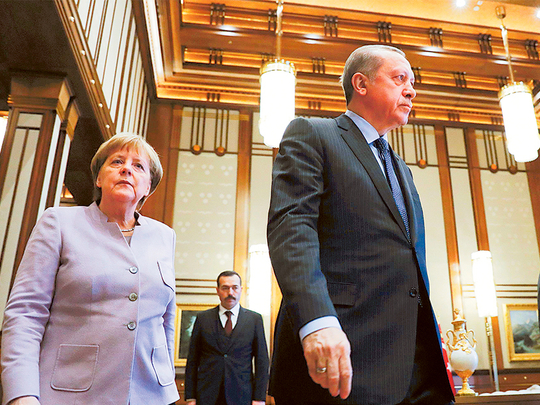
Ankara: German Chancellor Angela Merkel visited Turkey on Thursday to meet President Recep Tayyip Erdogan for the first time since July’s failed coup, seeking to keep a key partnership alive after a series of crises.
The relationship between the two Nato allies has been battered in the last months by a series of rows in the wake of the July 15 failed coup aimed at ousting Erdogan.
Berlin has repeatedly expressed unease over the extent of the crackdown that has seen some 43,000 people arrested in the wake of the putsch, under a state of emergency that has now lasted over half a year.
Erdogan, meanwhile, has vented his exasperation that Germany has not responded to requests for the extradition of hundreds of suspects linked to the coup, the Kurdish militant movement and the ultra-left.
Merkel on Thursday said she had raised concerns over freedom of expression in Turkey in talks with Erdogan.
“I emphasised from my side that in this far-reaching change the separation of powers and freedom of expression must be ensured,” Merkel said, referring to Erdogan’s plan for constitutional change to increase his powers that is set to be put to a referendum in April.
Merkel, who was set to meet later with representatives of two opposition parties, added: “Opposition belongs to a democratic state.”
Erdogan responded that a separation of powers would remain in place under the new constitution, with other centres of power along with the presidency.
“The legislative is still there. So is the executive and the judiciary. Their dissolution ... is out of the question,” said the Turkish president.
The number of asylum requests made to Germany from Turkish citizens has shot up from 1,700 in 2015 to 5,700 in 2016, likely due to the crackdown after the coup.
Last week it was reported that 40 Turkish soldiers stationed at Nato bases had asked Berlin for asylum, with Turkey pressing for the bids to be rejected.
While Germany has expressed alarm over an alleged deterioration of press freedom in Turkey, Ankara wants Berlin to hand over the former opposition Cumhuriyet newspaper’s editor-in-chief Can Dundar who escaped the country after the coup.
Dundar founded a new anti-Erdogan news portal in Germany — Ozguruz (We Are Free) — and received as an honoured guest by officials including President Joachim Gauck.
The visit is all the more sensitive with Erdogan planning a referendum in April on new powers that critics say will create one-man rule. Merkel faces elections at home in September where policy on Turkey will be a key issue.
Germany is home to some three million people of Turkish origin, the biggest population of Turks in the world outside Turkey.
The controversy over Ankara’s post-coup crackdown has dealt a new blow to its long-running EU membership bid, although Berlin has stopped short of backing Austrian calls for the entire process to be halted.
Reports have also said Ankara is irritated that German surveillance planes operating from its Incirlik airbase close to Syria are not handing over intelligence relating to Kurdish militia.
With the hugely controversial constitutional referendum looming in April, the visit has not been universally welcomed in Turkey, with opposition Republican People’s Party (CHP) leader Kemal Kilicdaroglu saying he was disappointed.
“She could say that Turkey must improve its democratic standards and a separation of powers is the backbone of the highest democratic standards,” he told the Sueddeutsche Zeitung newspaper.
Merkel was due to meet Kilicdaroglu and figures from the pro-Kurdish People’s Democratic Party (HDP) whose co-leaders are under arrest.
Opposition figures in Germany have also suggested Merkel should not be meeting Erdogan as he is presiding over the crackdown.
But Interior Minister Thomas de Maiziere defended the trip in comments to the Passauer Neue Presse: “The chancellor does not need advice. She knows what she has to do,” he said, adding the state of democracy in Turkey “gives reason for concern”.












